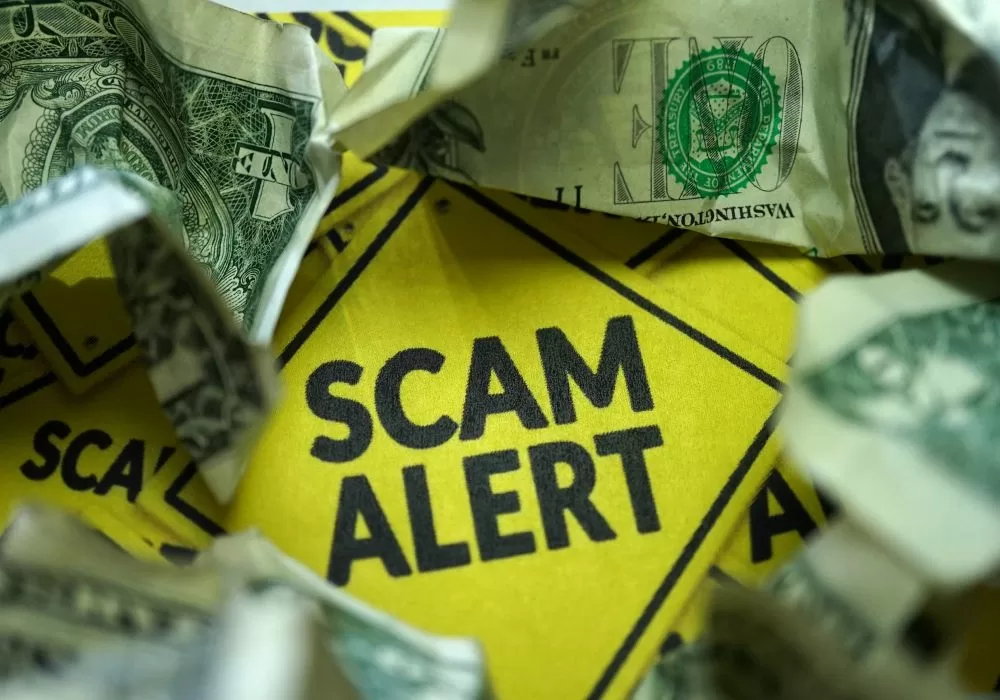
Tourist Taxi Scams & Travel Scams
Being subjected to Tourist Taxi Scams and scamming visitors is natural. You can see that when you consider it from the scammer’s perspective. Imagine yourself in their shoes, not saying it is right, just saying it will happen. It has bad side effects beyond the obvious impact of being intimidating and frustrating. It also gives a city a bad reputation and inflates costs.
In this article, we cover what to watch out for and the common scams in Southeast Asian countries like Vietnam, Thailand, and Cambodia. Then, we cover how to best avoid the scams. This means we also cover a full comparison of the rideshare apps, like Grab, Gojek and Be. We also cover a few alternatives to keep you safe from scams.
Lastly, we cover country-specific travel scams and what to watch out for in the major tourist hotspots, but in summary, most scams we have found are variations on a common theme.
Scams to Avoid
- Tourist Taxi Scams & Travel Scams
- Taxi Scams: How to Avoid Getting Ripped Off
- How to Avoid Tourist Taxi Scams Anywhere
- Reporting Taxi Scams:
- South East Asia Country Common Traveller Scams
- Vietnam Traveller Scams
- Cambodia Traveller Scams
- Scams in Specific Areas of Cambodia
- Laos Traveller Scams
Taxi Scams: How to Avoid Getting Ripped Off
Taxi scams are common in many Southeast Asian countries. They are discussed often on travel forums and blogs, but we can’t find official statistics on their frequency, so cannot answer the question “How often do scams happen?“. This makes it hard to quantify them. Bad stories get more attention than good ones on travel forums, YouTube, Instagram, and Facebook groups.
With this in mind, we’ve looked into the most frequent scams reported by visitors. We have discussed them broadly by category.
Taxis are handy in much of Southeast Asia, including Vietnam. Use this article’s information to stay sharp and out of trouble. Here’s a breakdown of the most frequent scams and how to avoid them:
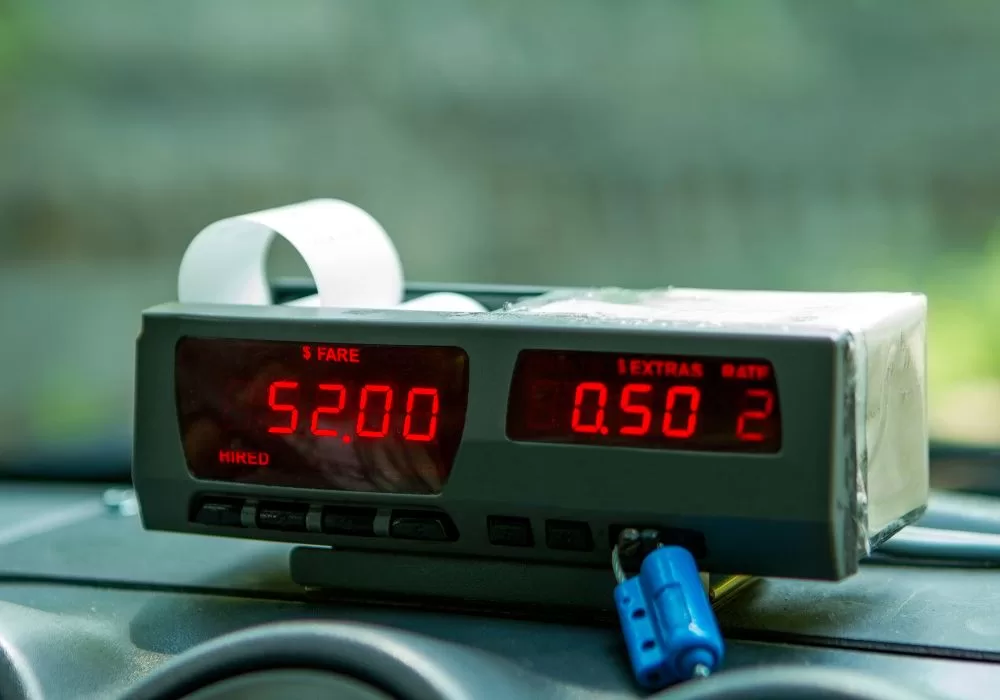
Scams involving the fare meter
- Tampered meter: This is an old classic. The meter is tampered with to make it count faster. This can vastly inflate your fare.
- Refusing to use the meter or the “No Meter” scam: This is about refusing to use the meter. In this scam, the driver may refuse to use the meter. Instead, insisting on a flat rate that’s often much higher than the usual fare. Local knowledge is the key here. Use Google Maps to help give you insight into the distance and likely fare.
- The “Broken Meter” scam: This is essentially the same as the “No Meter” scam. The driver claims that the meter is broken or unavailable. They demand a negotiated fare. Your best approach here is to walk away.
The Destination scam
- Being taken for a long ride: The Long Way, or being taken for a long ride, is when the driver takes a route that makes the journey longer than it needs to be. They do this to inflate the fare. This could involve heavy traffic areas and unnecessary detours.
- Fake attraction or location: Motivated by a kickback. Your driver may take you to a fake or overpriced tourist attraction. Where they might receive a commission.
Others – The sting in the tail scams
- Hidden Fees: The driver might add surprise charges for luggage or tolls. They weren’t mentioned upfront.
- Fake Money Scam: At the end of your journey, the driver claims your cash notes are fake and tries to pocket them.
Check out this article on planning your Southeast Asia Travel and Itinerary.
How to Avoid Tourist Taxi Scams Anywhere
Here are our tips for avoiding scams when you’re out and about checking out the sites. The best of these is to use ride-sharing or hailing apps like Uber and booking apps, like 12Go for longer journeys and also Grab or Gojek. Uber does not operate in most of Southeast Asia; it pulled out of most countries around 2018 due to intense competition from the likes of Grab.
Tip – Find Transport – Ferry, Buses, Trains and Planes
In all our travels around South East Asia, when we need to organise longer journeys between regions, capitals and countries, we have generally used 12Go to assess the options. They have a handy feature, which allows you to check the options and manage your travel bookings to get you from place to place on one page.
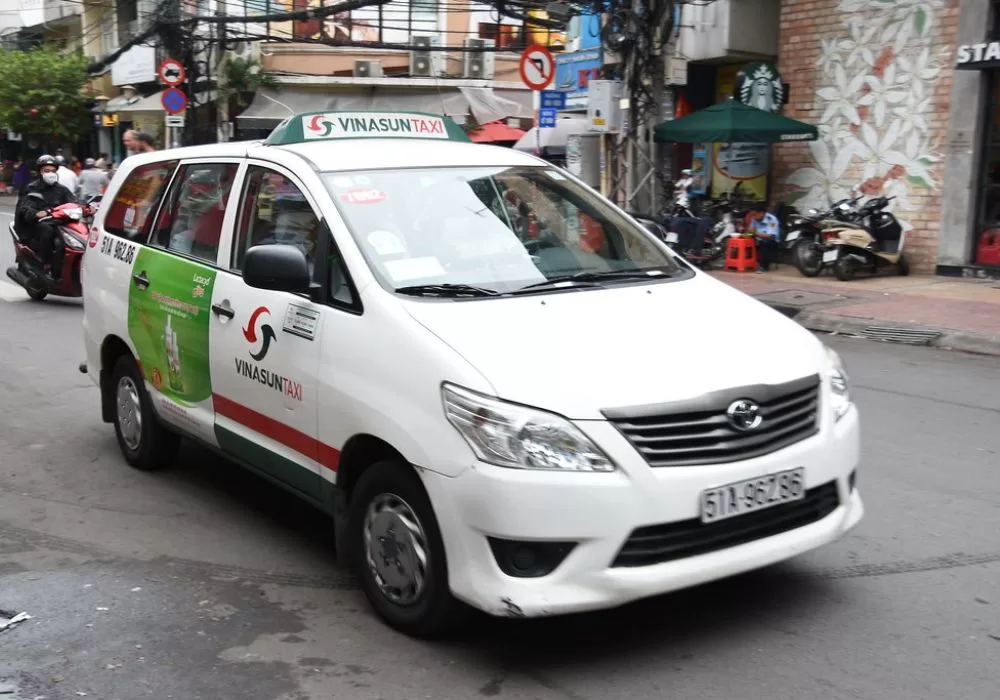
- Ride-hailing and ride-sharing apps: Use ride-hailing apps like Grab or Gojek. They offer clear fares. You can pay without cash through the app.
- Use reputable taxis: Look for metered taxis. They should be from good companies like Vinasun (white with green stripes) or Mai Linh (white with green logo) in Vietnam. These companies are known for their honesty and fair prices.
- Use Metered Taxis: If you must use a taxi, insist on one with a working meter. If you have any doubt, walk away. There are loads of other rides available.
- Negotiate the fare beforehand: If you must use a taxi and can’t find a Vinasun or Mai Linh taxi, negotiate the fare before you get in. Agree on using the meter first, before resorting to a fixed price. Get confirmation from the driver before starting your journey if the meter will be used.
- Know taxi fare estimates: If you can, use Google Maps and a ride-share app to estimate the fare. Do this before you negotiate. It’s going to help you know what to aim for.
- Carry small cash notes/currency: Have a small Vietnamese Dong (VND) for example. This will avoid the “fake money” scam and make negotiation easier.
- Be wary of airport hustlers. When you arrive, be cautious of hustlers offering taxis. These are often not registered and could be more prone to scams. Consider booking a ride through a ride-hailing app. Or, use the official airport taxi service. Or book an airport transfer service to collect you, Ho Chi Minh, Hanoi, Bangkok.
- Don’t be afraid to walk away. If you feel uncomfortable or suspect a scam, leave and get another taxi or use a ride-hailing app. There’s no shame in prioritizing your safety and wallet.
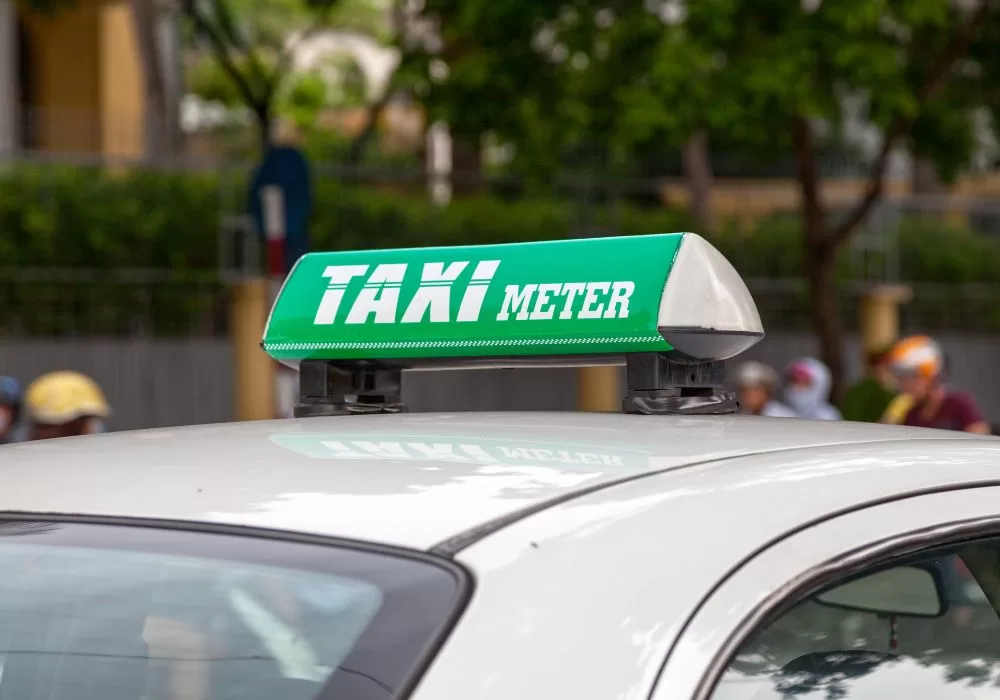
If you follow these tips, you’ll be much more unlikely to get scammed. Knowing what to look out for will help you to enjoy your travel throughout Southeast Asia. By the way, be sure to check out our guide to planning a trip in Southeast Asia here.
Reporting Taxi Scams:
If you fall victim to a taxi scam, report it to the local authorities. Also, report it to the Vietnam National Administration of Tourism. This action helps control the taxi industry and safeguards future travellers.
South East Asia Country Common Traveller Scams
Every scam we have come across, even when they are specific to a particular country are variations on a theme and almost every country in the world has variations of the scams we told you about already. In this section, we try to cover the scams as they are known to each region.
Thailand Common Traveller Scams
Thailand is probably the most well-documented when it comes to scams nieve tourists have been coming here for decades and all fall prey to the sophisticated schemes of scammers, especially when under the influence of drink, drugs or love. Here are some common scams to watch out for.
Tuk-Tuk Scams
- Overcharging: Tuk-tuk drivers are notorious for overcharging tourists. Always negotiate the fare before getting in.
- Detours: Drivers might take you on a longer route to increase the fare or drop you off at a commission-based shop.
- Fake Temples: Some drivers may claim a temple is closed and offer to take you to another one, often a tourist trap.
Gemstone Scams
- Overpriced Gems: You’ll be lured into a gem shop with promises of rare and valuable stones at incredibly low prices. These are often fake or overvalued and often have some form of intimidation associated with those who are not willing.
- High-Pressure Sales Tactics: Salespeople will use aggressive tactics to convince you to buy, often claiming limited availability or special discounts.
Taxi Scams
- Meter Tampering: Taxi meters can be manipulated to run faster, resulting in higher fares.
- Refusal to Use Meter: Some drivers might insist on a flat rate, which is often higher than the metered fare.
Other Scams
- Monkey Scams: In some tourist areas, you might encounter people with monkeys who ask for money to take a photo. Be cautious, as these monkeys can be aggressive.
- Fake Temples and Monks: Some scammers pose as monks or temple representatives, asking for donations or selling fake blessings.
- Pickpocketing: As with any crowded tourist area, be aware of pickpockets.
Vietnam Traveller Scams
Vietnam has its fair share of scams, most are similar to those discussed, so make sure you check out the situations we have already discussed. Below are some specifics though.
Transportation Scams
- Taxi Scams: This includes meter tampering, refusing to use the meter, taking longer routes, and fake destinations.
- Motorbike Rental Scams: Issues with damage charges, stolen bikes, or fake documents are common. This is also known as the Theft scam, where the rental bike will be stolen by a conspirator of the leasing company and you or your travel insurance pay up!
- Cyclo Scams: Overcharging and detours are common tactics.
Shopping Scams
- Fake Merchandise: Counterfeit goods, especially luxury items, are widely available.
- Overcharging: Haggling is expected, but some shops will start with exorbitant prices.
- Weight Manipulation: Some markets might use inaccurate scales for weighing goods.
Tourist Scams
- Street Vendors: Beware of persistent vendors who might try to force you to buy something or damage your belongings.
- Photo Scams: Some people will ask to take a photo with you and then demand payment.
- Begging Scams: While there is genuine poverty, some begging is organized.
Other Scams
- ATM Scams: Skimming devices are common, especially in isolated ATMs.
- Restaurant Scams: Adding extra items to your bill or overcharging for drinks is possible.
- Hotel Scams: Be cautious of booking through unofficial channels, as you might encounter fake hotels or overcharging.
- Hoi An Tailor Scams: While Hoi An is famous for tailoring, some shops might use low-quality materials or deliver products later than promised.
Cambodia Traveller Scams
Like the other areas we have discussed, the same themes are present as they are in areas like Thailand with Tuk-Tuk and Gemstone scams.
Other Scams
- Fake Orphanages: Be wary of organizations claiming to help orphans. Many are scams designed to solicit money.
- Begging Scams: Children or adults may approach you asking for money. While some cases are genuine, many are organized scams.
- Pickpocketing: As with any tourist destination, be aware of pickpockets, especially in crowded areas.
Scams in Specific Areas of Cambodia
Angkor Wat Scams
- Ticket Scams: Be cautious of people offering to sell you Angkor Wat tickets at a discount, as they might be fake.
- Tuk-Tuk Scams: Tuk-tuk drivers often try to overcharge for transportation to and from the temples.
Phnom Penh
- ATM Scams: Skimming devices are common on ATMs, especially those in isolated locations.
- Motorcycle Theft: While not a scam, theft of motorcycles is prevalent. Avoid renting motorbikes or parking them in unsecured areas.
- Fake Police: Be wary of individuals claiming to be police officers, demanding bribes or personal information.
Siem Reap
- Angkor Wat Ticket Scams: As mentioned previously, be cautious of fake tickets or overpriced tours.
- Tuk-Tuk Scams: Extremely common in this tourist-heavy area.
- Gemstone Scams: Siem Reap is notorious for gemstone shops targeting tourists.
Sihanoukville
- Drug Scams: The city has a reputation for drug-related activities. Be cautious of accepting drinks or substances from strangers.
- Scams Targeting Foreigners: Due to the large expat population, there are various scams targeting foreigners, including rental scams, employment frauds, and visa issues.
- ATM Scams: Similar to Phnom Penh, ATM skimming is a concern.
Laos Traveller Scams
Laos is no different to any of the other tourist hotspots in SE Asia, the same scams exist and the same unsuspecting victims are exploited. Here we have listed only a few specifics we found in Laos, that equally we have experienced elsewhere.
Visa and Border Scams
- Visa Fees: Be aware of unofficial agents offering visa assistance for a fee. It’s often cheaper to do it yourself.
- Border Crossing Fees: There might be attempts to charge extra fees at border crossings.
Scams in Specific Regions of Laos
While Laos is a relatively small country, there are some regional variations in scams.
Luang Prabang
- Tuk-Tuk Scams: Extremely common in this tourist-heavy area.
- Monk Almsgiving Scams: Some people may pose as monks to solicit money or goods.
- Elephant Trekking Scams: Be cautious of operators who mistreat elephants or offer overpriced tours.
Vientiane
- ATM Scams: Similar to other Southeast Asian cities, be cautious of skimming devices on ATMs.
- Taxi Scams: While less prevalent than in some other countries, it’s still possible to encounter overcharging or detours.
- Government Office Scams: Be wary of individuals claiming to represent government offices and requesting payments for various services.
Vang Vieng
- Tube Rental Scams: Some rental shops might charge excessive fees for damaged tubes or lost items.
- Drug Scams: The area has a reputation for drug use, and scams related to drug sales or consumption can occur.
- Alcohol-Related Scams: Be cautious of accepting drinks from strangers, as they might be spiked.
General Tips to Avoid Being Scammed:
- Always be aware of your surroundings.
- Trust your instincts. If something feels off, it probably is.
- Avoid carrying large amounts of cash.
- Use ATMs in well-lit and secure locations.
- Be cautious of unsolicited offers or advice.
- Research popular tourist attractions and scams associated with them before your trip.
Ride-share Apps Review
Check out our complete guide to Rideshare and Hailing Apps for SE Asia.
Tip – Alternative Apps to Consider in Southeast Asia
Grab, Gojek, and Be are major ride-hailing players in Southeast Asia. But, there are other options to consider based on your location and priorities for instance if you are travelling longer distances between cities or provinces. Here are some other options:
- 12Go is a great service to book your travel tickets between any locations you are travelling for instance town to town. They also offer Train, Bus and Plane tickets. Be sure to check them out.
- For tours check out services like Get Your Guide, Viator and Klook, which all allow you to pay online. Many tours will pick you up from an agreed location avoiding the need for a taxi.
- Regional ride-hailing apps operate in specific Southeast Asian countries. For example:
- FastGo is a growing ride-hailing app in Cambodia. It offers low prices and many vehicle options.
- Some traditional taxi companies offer booking apps. They provide a more formal experience. These might be good options if you prefer licensed taxis. You won’t mind potentially lower fares. Here’s an example:
- Easy Taxi operates in many Southeast Asian countries. It allows booking rides with licensed taxis through their app.
- Car rental services aren’t everywhere. They aren’t for everyone. But, they offer the flexibility of having your own car. Keep in mind factors like traffic, parking availability, and international driving permits.
Tip – Find Transport – Ferry, Buses, Trains and Planes
In all our travels around South East Asia, when we need to organise longer journeys between regions, capitals and countries, we have generally used 12Go to assess the options. They have a handy feature, which allows you to check the options and manage your travel bookings to get you from place to place on one page.
Remember: It’s good to research ride-hailing apps and car rentals at your destination. You can find the latest on availability, pricing, and user reviews. Also, ask your hotel what they recommend. They may have specific advice or services worth considering, which may not be discussed here.
Essential Travel Toolkit
🚖 Rideshare Apps – The most complete guide to Rideshare, Ride-hailing and taxis in Southeast Asia.
🚞 12Go.com – The easiest way to book transport, public or private in Southeast Asia, Japan and Beyond.
🏨 Trip.com – Consistently great accommodation and hotel deals.
🛩️ Trip.com – Get the best flight deals.
🚙 Trip.com – Find your perfect rental car.
🗺️ Getyourguide.com – Looking for an amazing local guide or tour. Get Your Guide will have something for everyone.
🗺️ Viator.com – Easily book tours and experiences at the lowest rate. Amazing options all over the world.
👨💻 NordVPN.com – Reliable VPN service that is guaranteed to keep you and your data safe anywhere in the world.

Dan’s a windsurfing, adventure-seeking nomad with a passion for exploring the globe overland and an Engineer. Having grown up in the Middle East, he brings a unique perspective to Getting Lost Again, sharing his love for discovering hidden gems and embracing the unexpected. When he’s not on the road, he finds inspiration in windsurfing and other creative pursuits – and is equally at home under a vehicle solving problems as he is exploring a new place.

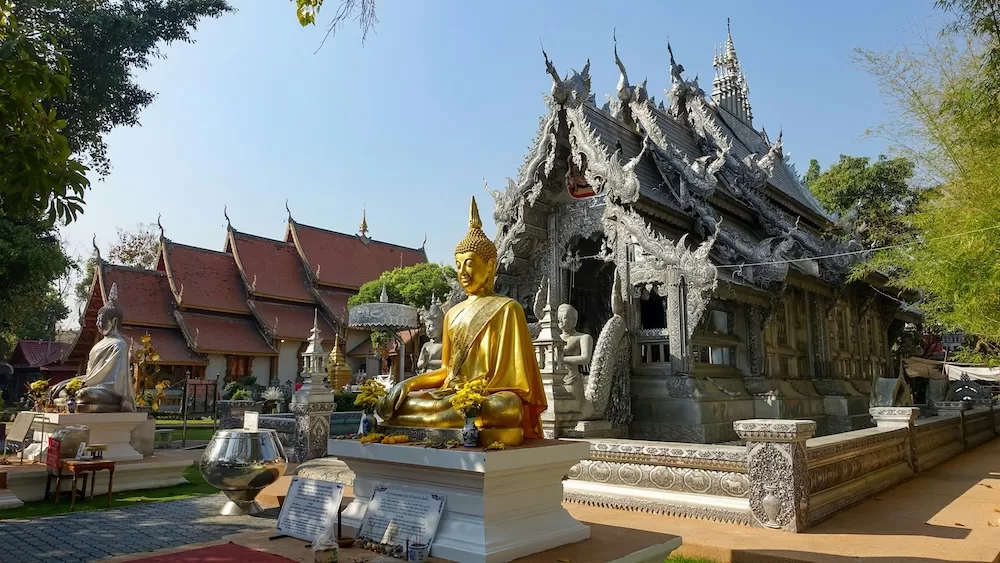

Pingback: 2024 Ultimate 2-Week Thailand Itinerary: Your Next Adventure